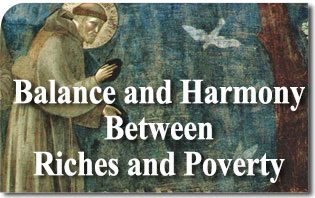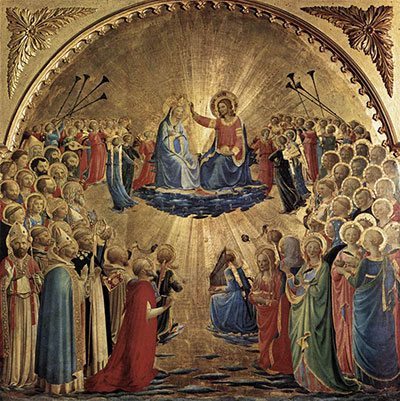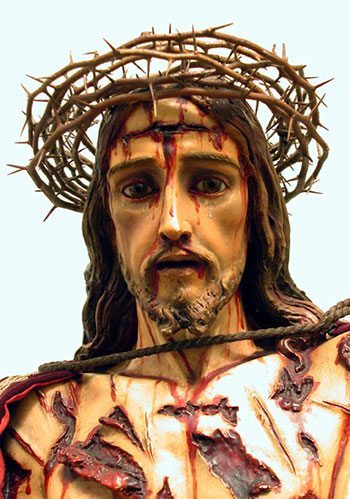 “Blessed are the poor in spirit: for theirs is the kingdom of heaven.”
“Blessed are the poor in spirit: for theirs is the kingdom of heaven.”
Pauperist Heresies
Heresies requiring material poverty for eternal salvation have sprung up since the dawn of Christianity.
Here we refer more particularly to medieval miserabilists. Under the influence of the Cathars or Albigensians, who adopted the Manichean principle that matter is not only evil but the source of all evil, so-called pauperist heresies such as the Waldensians, The Poor of Lyons, the Patarines, the Apostolic Brethren, the Little Brethren or Fraticelli, the Humbled, Beghards, Hussites, Taborites, etc. proliferated in France, Bohemia, and Italy. The movement later continued with the Protestant pseudo-Reformation as in the case of Thomas Munzer’s Anabaptist hordes in Germany.
In general, leaving aside their particularities, these heretics preached effective poverty as necessary for salvation, fought private property and both richness and splendor in the Church and in temporal society. They said there were two churches: one poor and deprived — the true church to which they belonged — and the other rich and carnal, led by the Pope, to which the bishops belonged.
The “Poor” According to Liberation Theology
Theoreticians of “Liberation theology” in its various branches adopt this heretical, pauperist view of the poor.
In a book intended to teach how to make “Liberation theology,” Friar Leonardo Boff and his brother, Friar Clodovis, wrote: “Also of inspirational value for liberation theology are the unique evangelical experiences of many heresy-leaning prophets… including the valuable contribution of pauperist medieval reform movements and the evangelical postulations of the great reformers.”1
In another book, the same ex-Friar Leonardo Boff employs the principles of liberation theology to distort the luminous figure of Saint Francis of Assisi and to lavish praise on the aforementioned pauperist movements: “The twelfth and thirteenth centuries…were characterized by great religious movements based on evangelical and apostolic life in the imitation of Christ crucified and poor, and in leading a radical life of poverty. They are the Patarines, the Poor of Lyons, the Waldensians, Albigensians, the Humbled and others, all of whom sided with the poor, especially in the cities. They formed perhaps the most radical movement in the spiritual history of Christianity.”2
The Spirit of Poverty
However, contrary to the claims of “Liberation Theology” — which revives these old pauperist and miserabilist heresies — spiritual perfection does not depend on material poverty but on detachment from earthly goods. A revolted poor man and a stingy rich man find themselves in the same state of spiritual imperfection.

The beatitude Our Lord preached, whose reward is the kingdom of heaven does not refer to those who lack material goods — sociological poverty — but to those who, whether materially rich or poor, are indeed “poor in spirit” — spiritual poverty.3
The beatitude of being “poor in spirit” results from a twofold detachment: detachment of self, by practicing the virtue of humility; and detachment from earthly things out of a reverential fear of God which makes one prefer the eternal goods to the fleeting goods of this world.4
This detachment makes both the rich and the poor take advantage of their spiritual situation, whether by being resigned with poverty, or by being generous in helping others.
Material Poverty: an Evangelical Counsel, Not a Commandment
Poverty, even voluntary, is neither an end in itself nor does it identify with perfection. It is a path that leads to perfection in the spirit of the Beatitudes and the Evangelical Counsels.
Conversely, wealth as such is not a hindrance to perfection if considered from the standpoint of “poverty of spirit.”
This is why Jesus Christ did not make material poverty a commandment but only an Evangelical Counsel.
Difference Between Commandments and Evangelical Counsels
“Christ in the Gospels laid down certain rules of life and conduct which must be practiced by every one of His followers as the necessary condition for attaining to everlasting life. These precepts of the Gospel practically consist of the Decalogue….
“Besides these precepts which must be observed by all under pain of eternal damnation, He also taught certain principles which He expressly stated were not to be considered as binding upon all, or as necessary conditions without which heaven could not be attained, but rather as counsels for those who desired to do more than the minimum and to aim at Christian perfection, so far as that can be obtained here upon earth. Thus (Matthew 19:16 sq.) when the young man asked Him what he should do to obtain eternal life, Christ bade him to ‘keep the commandments.’ That was all that was necessary in the strict sense of the word, and by thus keeping the commands which God had given, eternal life could be obtained. But when the young man pressed further, Christ told him: ‘If thou wilt be perfect, go sell what thou hast, and give to the poor.’
“This distinction between the precepts of the Gospel, which are binding on all, and the counsels, which are the subject of the vocation of the comparatively few, has ever been maintained by the Catholic Church.”5

The Friend of Jesus
Our Lord did not require the young man to practice material poverty as a condition for salvation, nor did He require it of his rich friends such as Lazarus and his sisters, Joseph of Arimathea, Nicodemus, or the holy women who accompanied and served Him with their goods. However, He warned everyone about the danger of earthly goods and exhorted them to live for the Kingdom of Heaven.6
Christ Made Himself Poor in Order to Make Us Rich
Voluntary poverty for the sake of the Kingdom of Heaven is one of the most beautiful initiatives inspired by the Gospels. Elite souls seek the riches of eternity by abandoning worldly goods.
This spirit is well summarized by the statement of the Apostle Saint Paul: “For you know the grace of our Lord Jesus Christ, that being rich he became poor, for your sakes; that through his poverty you might be rich.”7
The wealth of graces that the Savior’s material poverty obtained for us enables us to practice the true spirit of poverty, both as it is found in the commandments — according to justice and charity — and in relation to material poverty, whether as an Evangelical Counsel or imposed upon us by the circumstances.
Poverty and Splendor
By balancing virtues, the Church harmonizes poverty and wealth, simplicity and splendor.
To balance and harmonize wealth and poverty, fruits of the spirit of the Gospels and the Beatitudes, has always been the doctrine preached by the Church, Popes, Holy Doctors and the great preachers that illuminated Christendom.
Read Also:
Did Saint Francis Advocate a Poor Catholic Worship Without Pomp?
Humility Is Compatible with the Rich Dress of One’s Office
Humility, Magnanimity and Magnificence
Footnotes
- Leonardo Boff and Clodovis Boff, Como Fazer Teologia da Libertação (Petrópolis: Vozes, 1986), 57. Note that Friar Clodovis Boff, O.S.M, later recanted and even criticized this doctrine. Instead, his brother Leonardo, who left the priesthood but remains a leader of Liberation Theology, maintains his adhesion to these doctrines.
- Leonardo Boff, São Francisco de Assis, Ternura e Vigor (Petrópolis: Vozes, 1985), 75.
- “Blessed are the poor in spirit: for theirs is the kingdom of heaven” (Matt. 5:3).
- Cf. Saint Thomas Aquinas, Summa Theologica, II-II, q. 19, a.12.
- A. Barnes, The Catholic Encyclopedia (New York: Robert Appleton Company, 1908), s.v. “Evangelical Counsels,” accessed Apr. 15, 2013 from New Advent: http://www.newadvent.org/cathen/04435a.htm
- Cf. Pirot, Béatitudes évangeliques, in Bernard Loth et Albert Michel, Dictionnaire de Théologie Catholique, Tables Generales (Paris: Letouzey et Ané, 1967), 3507.
- 2 Cor. 8:9.

